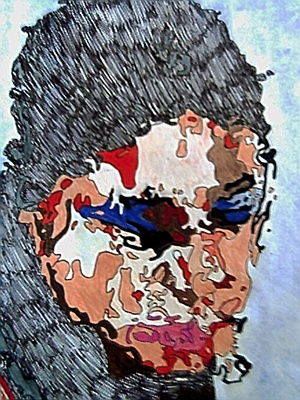All Nonfiction
- Bullying
- Books
- Academic
- Author Interviews
- Celebrity interviews
- College Articles
- College Essays
- Educator of the Year
- Heroes
- Interviews
- Memoir
- Personal Experience
- Sports
- Travel & Culture
All Opinions
- Bullying
- Current Events / Politics
- Discrimination
- Drugs / Alcohol / Smoking
- Entertainment / Celebrities
- Environment
- Love / Relationships
- Movies / Music / TV
- Pop Culture / Trends
- School / College
- Social Issues / Civics
- Spirituality / Religion
- Sports / Hobbies
All Hot Topics
- Bullying
- Community Service
- Environment
- Health
- Letters to the Editor
- Pride & Prejudice
- What Matters
- Back
Summer Guide
- Program Links
- Program Reviews
- Back
College Guide
- College Links
- College Reviews
- College Essays
- College Articles
- Back
Their Homeland MAG
When I was eight, my mother and father decided to send my sister and me to their homeland, Ukraine, for nine months. The idea was for us to come back fluent in Russian, in love with our roots, and possibly more independent.
My sister was 11 and just as unsure as I was. I felt impressionable and scared. In Ukraine, we lived with my aunt, my uncle, and their only child. To say that I missed home was an understatement. I wanted to be around my friends, my school, and my town. I was so consumed with the memory of the compassionate people who filled my world back in the States that I felt bitter toward every opportunity Ukraine provided.
In America, I had teachers willing to stay after school to make sure that I understood a math problem. I had coaches tirelessly working with me on my jump shot until it was absolutely perfect, and I had parents making sure I always had a ride home from school. In America, I lived in a community that looked out for me, but my eight-year-old self did not understand the importance of this – until it was no longer there.
In Ukraine, I walked five miles to and from school every day with my uncle. Because he took little interest in me, I created imaginary friends to keep me company as I trudged beside him, weakly gripping his hand. Every day, I wore a navy blue dress with tights and a pony tail. It was frowned upon to wear anything in one’s hair besides a black elastic, so I always ended up going without a bow.
My Ukrainian school was unlike anything I had ever encountered. I had one teacher for most subjects, which included mathematics, health, Ukrainian, Russian history, English, science, German, and, of course, Russian. We ate lunch in a dining hall that was roughly the size of a small theater stage and joked around as much as the cafeteria ladies would tolerate. Many of my peers took public transportation by themselves and had been doing so since they were six.
One of my friends was more than just a student; she was the oldest of her three siblings and dreamed of becoming a dancer. I befriended her instantly as we were both new to the school. She once described to me how she would have to buy produce after school, cook dinner for her siblings, and finish all of her homework before she was allowed to go to dance class. Her parents lacked the financial means to pay for her lessons, so she paid herself. Even though her reality was difficult, she persevered. I had never met anyone as independent and mature as she was at such a young age. I felt incompetent in comparison to my Russian classmates, who were forced to be productive so early in life. I wanted to find my worth too and feared being inadequate.
When I arrived back in the States, I could no longer see eye-to-eye with the kids with whom I had learned my ABCs and played on the playground. I couldn’t understand how they could complain about such minuscule things. I would get upset when my peers didn’t respect their teachers. Overall, my exposure to life in another country – one where everyone had to fend for themselves – gave me better judgment about who I would open up to, where I would devote my time, and how I should treat the people in my life.
I started to appreciate the amount of time I could dedicate to my studies and the opportunities my community provided that were lacking in the Ukraine. I learned a lot about myself by experiencing adversity with virtually no support system in a country that spoke a language I barely knew. My involuntary trip to the Ukraine opened my eyes to a world where the most important thing is not what’s on the lunch menu, but how food will be paid for. This keeps me grounded and level-headed in times when I cannot find my own answers.
My experience in the Ukraine continues to push me to become a person with a wider perspective and empathy for different cultures and traditions. Thinking about my friend with three siblings and a dream pushes me to achieve more than I could had I not met her.
Mark Twain encapsulated much of what I have learned when he said, “Travel is fatal to prejudice, bigotry, and narrow-mindedness, and many of our people need it sorely on these accounts. Broad, wholesome, charitable views of men and things cannot be acquired by vegetating in one little corner of the earth all of one’s lifetime.”

Similar Articles
JOIN THE DISCUSSION
This article has 0 comments.
